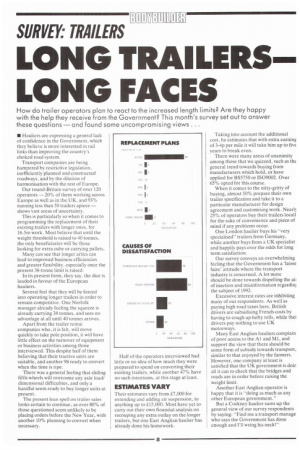LONG TRAILERS LONG FACES
Page 130

If you've noticed an error in this article please click here to report it so we can fix it.
• Hauliers are expressing a general lack of confidence in the Government, which they believe is more interested in rail links than improving the country's choked road system.
Transport companies are being hampered by restrictive legislation, inefficiently planned and constructed roadways, and by the dilution of harmonisation with the rest of Europe.
Our round-Britain survey of over 120 operators— 20% of them working across Europe as well as in the UK, and 93% running less than 50 trailers apiece — shows vast areas of uncertainty.
This is particularly so when it comes to programming the replacement of their existing trailers with longer ones, for 16.5m work. Most believe that until the weight threshold is raised to 40 tonnes, the only beneficiaries will be those looking for extra cube or carrying pallets.
Many can see that longer artics can lead to improved business efficiencies and greater flexibility, especially once the present 38-tonne limit is raised.
In its present form, they say, the dice is loaded in favour of the European hauliers.
Several feel that they will be forced into operating longer trailers in order to remain competitive. One Norfolk manager already feeling the squeeze is already carrying 38 tonnes, and sees no advantage at all until 40 tonnes arrives.
Apart from the trailer rental companies who, it is felt, will move quickly to take pole position, it will have little effect on the turnover of equipment or business activities among those interviewed. This despite half of them believing that their tractive units are suitable, and another 98 ready to convert when the time is ripe.
There was a general feeling that sliding fifth-wheels will overcome any axle load/ dimensional difficulties, and only a handful seem ready to buy longer units at present.
The present lean spell on trailer sales looks certain to continue, as over 80% of those questioned seem unlikely to be placing orders before the New Year, with another 10% planning to convert when necessary. Half of the operators interviewed had little or no idea of how much they were prepared to spend on converting their existing trailers, while another 47% have no such intentions, at this stage at least.
Their estimates vary from £7,000 for extending and adding air suspension, to anything up to £15,000. Most have yet to carry out their own financial analysis on recouping any extra outlay on the longer trailers, but one East Anglian haulier has already done his homework. Taking into account the additional cost, he estimates that with extra earning of 3-4p per mile it will take him up to five years to break even.
There were many areas of unanimity among those that we quizzed, such as thc general trend towards buying from manufacturers which hold, or have applied for BS5750 or IS09002. Over 65% opted for this course.
When it comes to the nitty-gritty of buying, almost 50% prepare their own trailer specification and take it to a particular manufacturer for design agreement and customising work. Nearll 25% of operators buy their trailers locall for the sake of convenience and piece of mind if any problems occur.
One London haulier buys his "very specialised" trailers from Germany, while another buys from a UK specialist and happily pays over the odds for long term satisfaction.
Our survey conveys an overwhelming feeling that the Government has a laisse faire' attitude where the transport industry is concerned. A lot more should be done towards dispelling the ai] of inaction and misinformation regardiN the subject of 1992.
Excessive interest rates are inhibiting many of our respondents. As well as paying high road taxes here, British drivers are subsidising French costs by having to cough up hefty tolls, while thei drivers pay nothing to use UK motorways.
Many East Anglian hauliers complain of poor access to the Al and Ml, and support the view that there should be some form of subsidy towards transport, similar to that enjoyed by the farmers. However, one company at least is satisfied that the UK government is doir all it can to check that the bridges and roads are in order before raising the weight limit.
Another East Anglian operator is happy that it is "doing as much as any other European government."
But a Cockney haulier sums up the general view of our survey respondents by saying: "Find me a transport manage who says the Government has done enough and Ill wring his neck!"






























































































































































